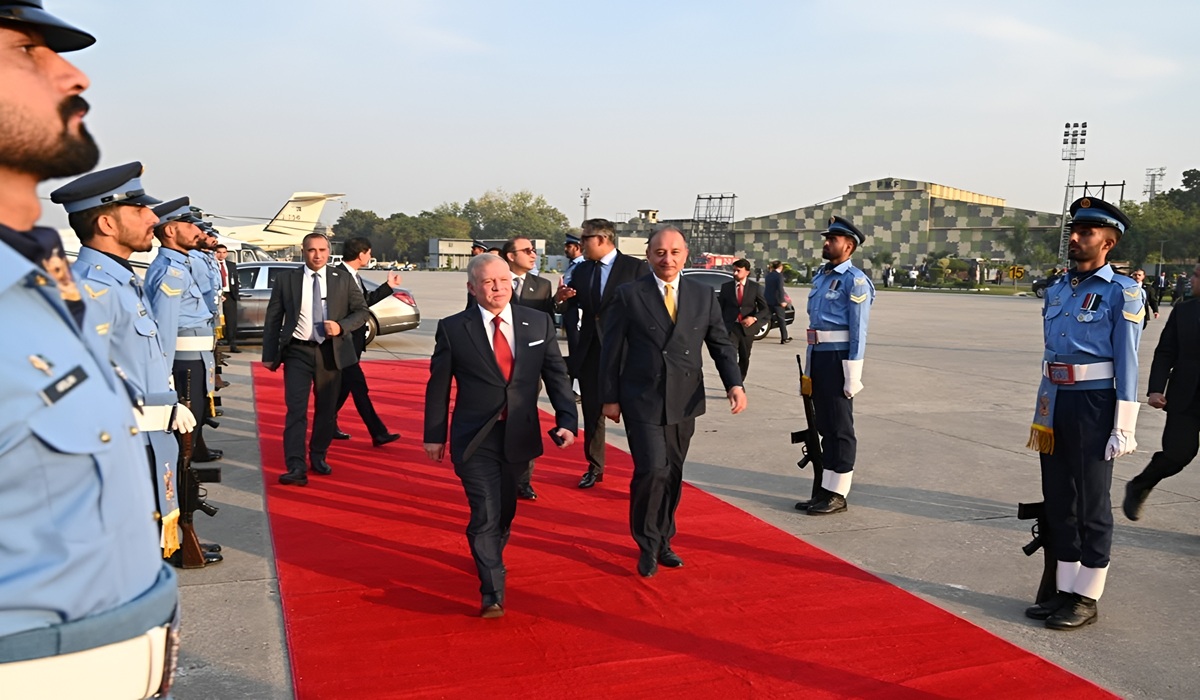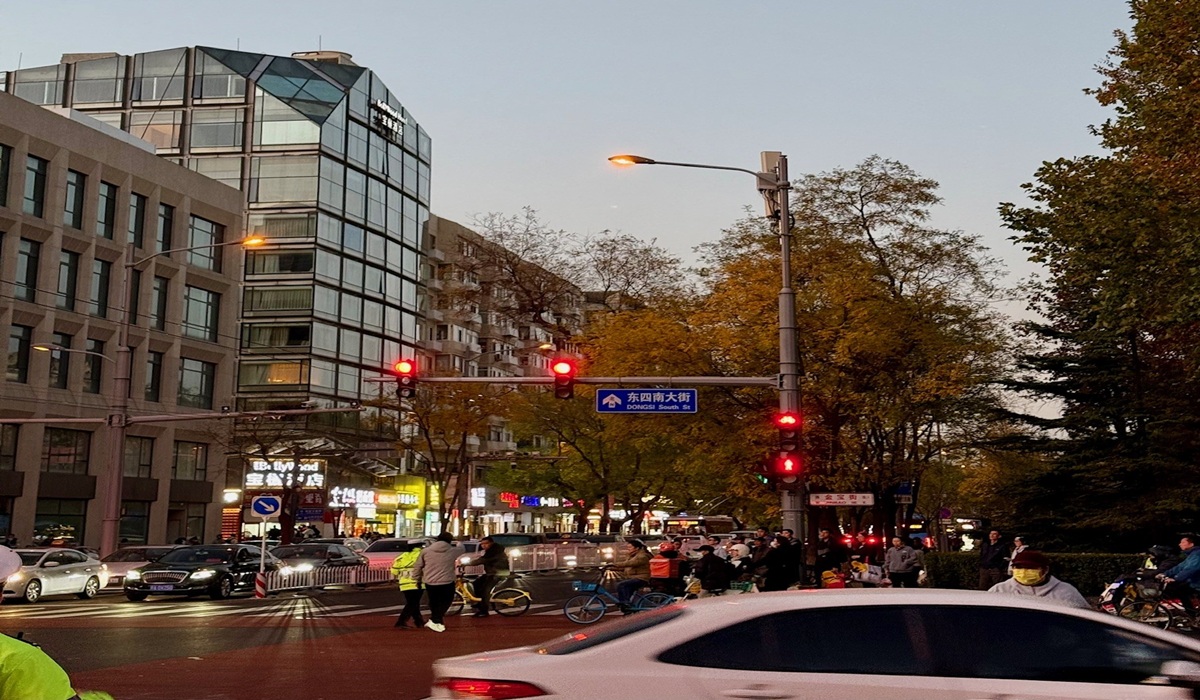King Abdullah II’s Visit to Pakistan: Strategic Diplomacy in a Fractured World
- Naveed Aman Khan
- Asia
- South Asia
- Trending News
- November 17, 2025

The recent visit of Jordan’s King Abdullah II to Pakistan—and the grand VVIP reception accorded to him upon arrival at Noor Khan Airbase—has become a defining diplomatic event for Islamabad in 2025. It is not often that Pakistan’s President and Prime Minister personally receive a visiting head of state on the tarmac, flanked by senior military leadership, ceremonial guards, and state protocol of the highest order. Such symbolism is never accidental. It is strategic, intentional, and built on layers of political, religious, regional, and global considerations.
King Abdullah II’s visit comes at a time when the Muslim world faces acute fragmentation, the Middle East is undergoing violent turmoil, and the Israel–Palestine conflict has entered one of its most volatile phases in decades. Within this global context, Pakistan’s decision to extend unprecedented protocol is an attempt to send clear messages—both outward and inward. The relationship between Pakistan and Jordan may not always dominate headlines, but it possesses deep historical roots. Since the 1960s, Pakistani officers have trained Jordanian military units, while Jordan supplied key military hardware and intelligence cooperation over the years. These ties were especially notable during the 1970s and 1980s when Islamabad and Amman coordinated extensively within broader Muslim-world security issues.
Fast forward to today, both countries find themselves navigating new geopolitical tensions, shifting alliances, and shared security threats—from the rise of violent extremism to unstable borders and the growing influence of non-state actors. Revisiting old partnerships and forging new alignments has therefore become a necessity.
Not every leader receives the kind of reception Pakistan gave King Abdullah II. The presence of both Shehbaz Sharif and Asif Ali Zardari, standing side-by-side at the airbase, sends four powerful messages:
First, it demonstrates Pakistan’s internal political unity. At a time when domestic politics often appear divided, presenting a coordinated front for an important Muslim leader allows Pakistan to project stability.
Second, it reflects the reverence Pakistan holds for King Abdullah’s role as the custodian of Jerusalem’s holy sites. His voice regarding Al-Aqsa Mosque and Palestinian rights carries extraordinary weight in the international arena.
Third, it signals a recalibration of Pakistan’s Middle East diplomacy. Islamabad is reassessing its strategic footprint beyond the Gulf states—towards Jordan, Turkey, Egypt, and other moderate Middle Eastern powers.
Fourth, it underscores shared concerns about regional instability, especially after rising violence in Gaza, increasing Israeli military operations, and escalating tensions across the Levant.
The Palestine Connection—Direct and Indirect is important. While the visit is multi-dimensional, it is impossible to separate it from the Israel–Palestine conflict. Jordan is uniquely positioned: nearly half of its population is of Palestinian origin, and it bears the internationally recognized responsibility of maintaining and protecting the holy sites of Jerusalem. Any escalation in Gaza or the West Bank has direct repercussions for Amman. The situation in Jerusalem is especially critical; any attempt by Israel to change the city’s status triggers strong reactions in Jordan.
Pakistan, on the other hand, has consistently adopted a clear and moral position on Palestinian statehood. Islamabad’s refusal to establish relations with Israel without a just settlement has shaped its foreign policy for decades.
King Abdullah’s presence in Islamabad aligns two important Muslim-world voices at a time when global diplomacy is shifting dangerously towards silence on Gaza’s humanitarian catastrophe. Both countries are seeking to coordinate messaging at the UN, OIC, and other international platforms.
Though Palestine remains central, there are several other significant drivers behind the visit:
With Afghanistan experiencing an uptick in extremist activity and border instability, Pakistan and Jordan aim to enhance intelligence-sharing mechanisms. Joint training programs, military exchanges, and potential procurement agreements are expected to be revitalized.
Both countries occupy moderate positions in a region increasingly divided between radicalism and hardline geopolitics. Beijing’s rise in Middle Eastern diplomacy requires Pakistan and Jordan to reassess their strategic alignments. Washington’s shifting priorities create new spaces for collaboration between Muslim-majority states.
Domestically, this visit helps strengthen the narrative that Pakistan is reclaiming its diplomatic influence in the Muslim world. It signals that despite economic challenges, Islamabad remains an important center for regional consultation. It also boosts confidence within Pakistan’s foreign policy establishment, demonstrating that Islamabad still holds the ability to convene high-level engagements that carry global importance. For Pakistan’s military, the visit could mean enhanced training exchanges, shared counterterrorism strategies, and joint exercises—important given Pakistan’s ongoing operations against militant networks.
The visit sets the stage for a broader coalition of moderate Muslim states. Countries such as Pakistan, Jordan, Egypt, Turkey, and Indonesia share similar concerns: extremism, sectarian conflict, and great-power competition shaping the Muslim world’s future. In this sense, the Islamabad-Amman engagement may contribute to the emergence of a diplomatic bloc capable of addressing collective threats and advocating for coordinated positions on critical issues—especially Palestine.
On the global stage, King Abdullah’s visit carries a number of key implications:
It reminds the West that Pakistan remains relevant in Middle Eastern geopolitics.
It amplifies the Palestinian narrative at a time when global attention is polarized.
It strengthens Jordan’s efforts to preserve the sanctity and legal status of Jerusalem’s holy sites.
It creates new avenues for Muslim diplomatic cooperation at international forums.
King Abdullah II’s visit to Pakistan is both symbolic and substantive. It reflects a shared understanding that in a fractured global order, Muslim nations must build alliances rooted in moderation, diplomacy, and long-term strategic interests. The grand reception at Noor Khan Airbase was not just a gesture—it was a statement of intent. Pakistan and Jordan now stand at a pivotal moment. Their collaboration has the potential to influence regional stability, reshape Muslim-world diplomacy, and strengthen the global movement for justice in Palestine.








